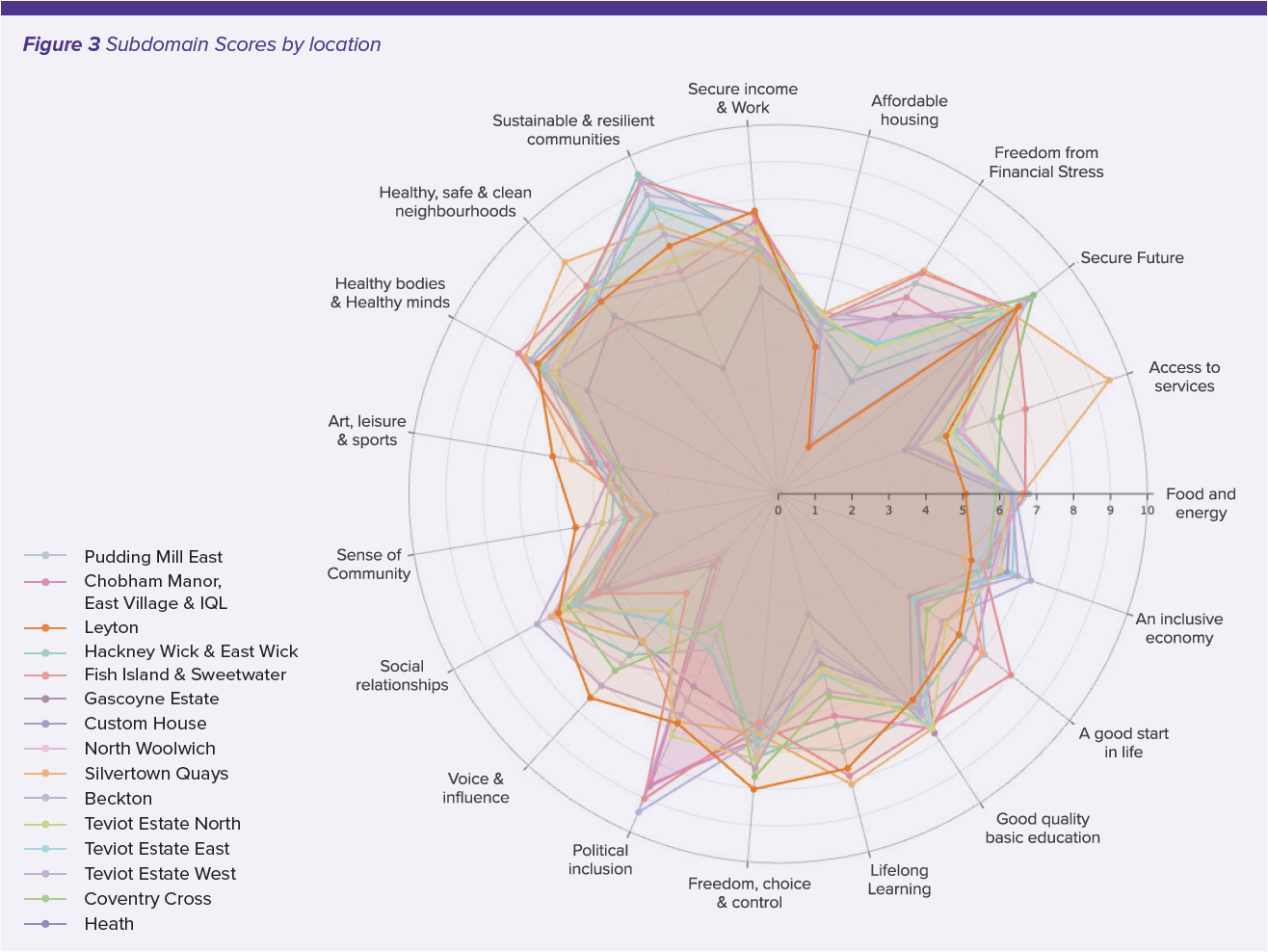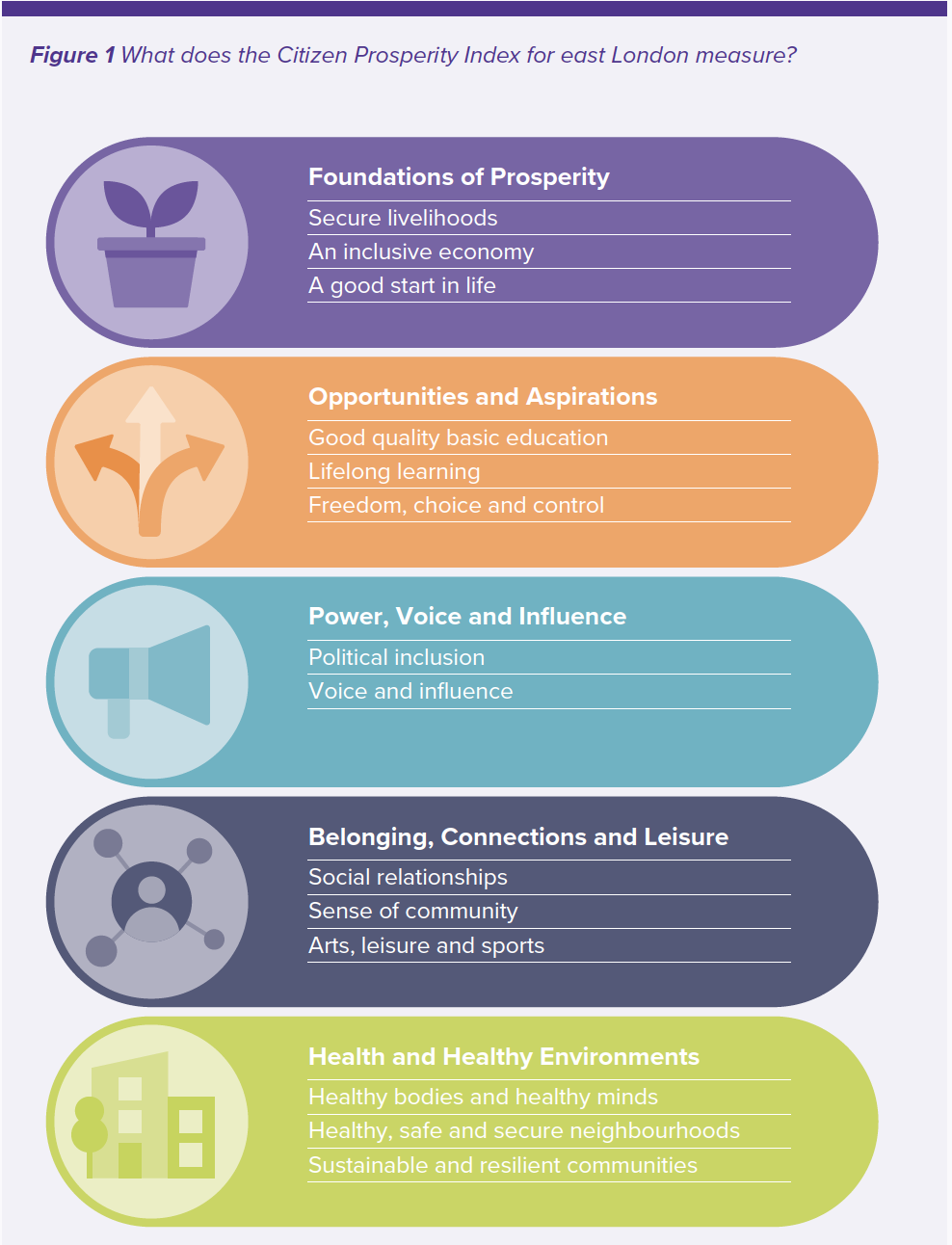Get updates from The Developer straight to your inbox Yes, please!
“Prosperity does not spillover” from regeneration sites to wider neighbourhood
At face value, developments deliver prosperity, but there are stark differences between people living on and nearby sites, industry-backed report reveals

Residents living on new regeneration sites report higher quality of life than those on the fringes of development, early findings from the Prosperity in East London 2021-2031 Longitudinal Study reveal. But their quality of life did not ‘spillover’ to those living in established communities next door.
The persistence of disadvantage and insecurity in areas within 1-2 miles of the Olympic Park boundary is seen as particularly noteworthy, after over a decade of development.
Self-reporting on a range of factors, residents living in new developments at sites including Silvertown Quays, Fish Island and the Olympic Legacy Opportunity Area scored highly in attributes including community life, a sense of voice and influence and health.
Housing stress in East London is widespread, affecting not only those on a low income, but even the highest earners – this was identified as the main barrier to a good life
The paper concludes that structural inequalities “are too great” to be addressed by urban development without “targeted interventions that adopt an intersectional approach.”
“It’s time to rethink this assumption in regeneration policy, planning and practice, and adopt an evidence-based approach,” the authors write.
The report underlines the need for hyperlocal assessments, targeted action on disadvantage and more strategic regeneration policy goals. Statistics in the report reveal how “prosperity is ‘imported’ by attracting higher-income households to East London and not generating prosperity gains for disadvantaged local communities.”
“Residents in new neighbourhoods report scores 7% higher for health and mental well-being and 9% higher for the perception of their neighbourhoods as healthy, safe, and clean”
Residents of new developments “indicate better economic outcomes, greater security and a more equitable distribution of benefits,” than neighbours living on the fringe of developments in established housing.
“Overall, residents in new neighbourhoods report scores 7% higher for health and mental well-being and 9% higher for the perception of their neighbourhoods as healthy, safe, and clean,” the report finds. Residents of new neighbourhoods also report less anxiety, are more satisfied with their living space and housing quality.
“These findings suggest that the newer residential areas may offer environmental and lifestyle factors that contribute positively to both physical and mental health outcomes and overall living conditions.”
Another key finding in the report is that housing stress in East London is widespread, affecting not only those on a low income, but even the highest earners reporting difficulties.
These high levels of insecurity are highlighted as the main barrier to a good life in East London: “Livelihood security is multi-dimensional and people rely on an overlapping set of resources including secure work and income, secure and genuinely affordable housing, food and energy security, freedom from financial stress and basic services like public transport and internet access.”
The report calls on livelihood security to be the strategic goal for regeneration policy. “The persistence of insecurity across all research sites and demographics highlights the need for livelihood security, as a multi-dimensional concept not solely employment, to be a strategic goal for regeneration policy, recognising the complex interdependencies between livelihood security, financial stress and health outcomes.”
Measures of livelihood security include good quality and secure jobs – including well-paid work, equality at work, scope for career progression, work/life balance and feeling part of the economic life of the neighbourhood/city, alongside secure, affordable and good quality housing, a mix of housing tenures, the likelihood of being able to stay in the neighbourhood and living without financial stress.
Piloted in 15 East London neighbourhoods, the study follows over 4,000 households for 10 years in areas undergoing long-term urban regeneration
The longitudinal study uses the Citizen Prosperity Index as a method of measuring prosperity based on lived experiences and local determinants of prosperity – the metric was developed with citizen scientists and academic researchers working with the London Prosperity Board.
The metric has been piloted in 15 East London neighbourhoods as part of the Prosperity in East London 2021-2031 Longitudinal Study which follows over 4,000 households for 10 years in areas undergoing long-term urban regeneration.
The goal of the study is to determine how prosperity is shared between local communities undergoing urban regeneration investment. The study areas are focussed around areas of multiple deprivation located next to new mixed-income communities attracting new residents, including three neighbourhoods constructed as part of the Olympic legacy, as well as neighbourhoods such as Custom House in Beckton and the Gascoyne Estate in Hackney.
In the first phase (2015-2016) citizen scientists conducted over 250 interviews, focus groups, walking ethnographies and mapping exercises to determine the opportunities and obstacles to prosperity affecting local people.
The study was funded by Royal Docks, Lendlease, London Legacy Development Corporation, Hill Group, Poplar HARCA and the London Boroughs of Hackney, Waltham Forest and Barking and Dagenham. It is led by the Institute for Global Prosperity’s (IGP) Prosperity Co-laboratory UK (PROCOL UK) in partnership with the UCL Centre for Longitudinal Studies, and co-designed with members of the London Prosperity Board.
Find out more: Read about the Citizen Prosperity Index and find out more about the Prosperity in East London 2021-2031 Longitudinal Study
If you love what we do, support us
Ask your organisation to become a member, buy tickets to our events or support us on Patreon
Sign up to our newsletter
Get updates from The Developer straight to your inbox
Thanks to our organisation members
Become a member
© Festival of Place - Tweak Ltd., 124 City Road, London, EC1V 2NX. Tel: 020 3326 7238


